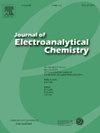Pre-magnetization smashing hydrated vanadium ions to improve redox flow batteries performance
IF 4.1
3区 化学
Q1 CHEMISTRY, ANALYTICAL
引用次数: 0
Abstract
The vanadium redox flow battery (VRFB) has received extensive attention due to its intrinsic safety and high scalability. Currently, there are still deficiencies of low energy efficiency and higher unit capacity cost in VRFB energy storage. Continuously optimizing the battery performance through reducing electrode polarization losses is a necessary way to achieve efficient VRFB energy storage technology. In this study, a method of pre-magnetizing the electrolyte to improve the performance of the battery was proposed. A permanent magnet with an intensity of 0.9 T was used to pre-magnetize the vanadium-ion aqueous electrolyte before feed into the battery stack and working-on, it was found that the diffusion capacity of vanadium ions increased by 133.6 % after pre-magnetized even if the external magnetic field was removed. Meanwhile, both of the charge transfer and concentration polarization resistance of the electrode were reduced. The energy efficiency (EE) of the battery was increased by 6.4 % in the charge–discharge test at current density of 300 mA cm−2. The power density increased by 6.19 % with current density 400 mA cm−2 at most, and it prefers to continuously increase as current larger. The electrolyte pre-magnetization showed significant positive improvements on the electrode reaction kinetics and battery charge–discharge cycle.
预磁化粉碎水合钒离子,提高氧化还原液流电池性能
钒氧化还原液流电池(VRFB)因其固有的安全性和高可扩展性而受到广泛关注。目前,钒氧化还原液流电池储能仍存在能量效率低、单位容量成本高等不足。通过降低电极极化损耗不断优化电池性能是实现高效 VRFB 储能技术的必要途径。本研究提出了一种对电解液进行预磁化以提高电池性能的方法。使用强度为 0.9 T 的永磁体对钒离子水溶液电解液进行预磁化后再注入电池堆,结果发现,即使去除外部磁场,预磁化后钒离子的扩散能力也提高了 133.6%。同时,电极的电荷转移电阻和浓度极化电阻都降低了。在电流密度为 300 mA cm-2 的充放电测试中,电池的能量效率(EE)提高了 6.4%。在电流密度为 400 mA cm-2 时,功率密度最多增加了 6.19%,而且随着电流的增大,功率密度会持续增加。电解液预磁化对电极反应动力学和电池充放电循环有显著的积极改善作用。
本文章由计算机程序翻译,如有差异,请以英文原文为准。
求助全文
约1分钟内获得全文
求助全文
来源期刊
CiteScore
7.80
自引率
6.70%
发文量
912
审稿时长
2.4 months
期刊介绍:
The Journal of Electroanalytical Chemistry is the foremost international journal devoted to the interdisciplinary subject of electrochemistry in all its aspects, theoretical as well as applied.
Electrochemistry is a wide ranging area that is in a state of continuous evolution. Rather than compiling a long list of topics covered by the Journal, the editors would like to draw particular attention to the key issues of novelty, topicality and quality. Papers should present new and interesting electrochemical science in a way that is accessible to the reader. The presentation and discussion should be at a level that is consistent with the international status of the Journal. Reports describing the application of well-established techniques to problems that are essentially technical will not be accepted. Similarly, papers that report observations but fail to provide adequate interpretation will be rejected by the Editors. Papers dealing with technical electrochemistry should be submitted to other specialist journals unless the authors can show that their work provides substantially new insights into electrochemical processes.

 求助内容:
求助内容: 应助结果提醒方式:
应助结果提醒方式:


